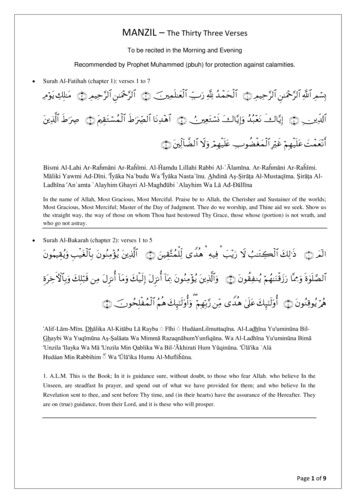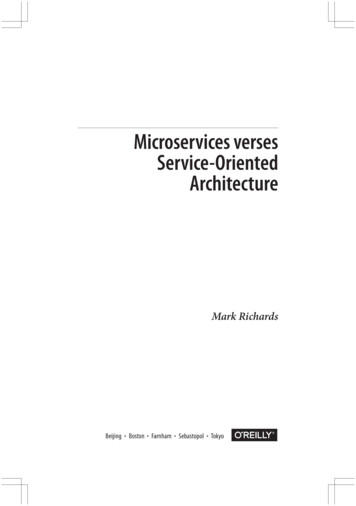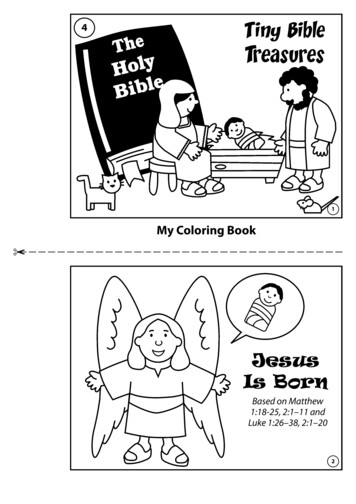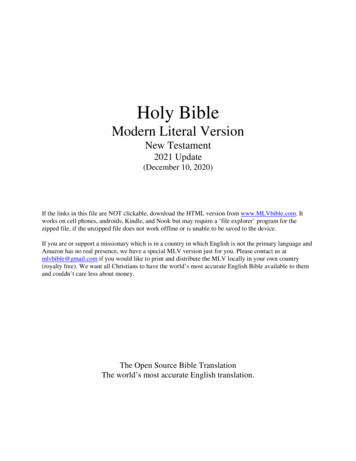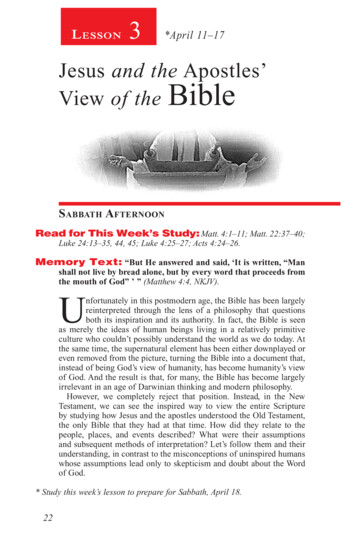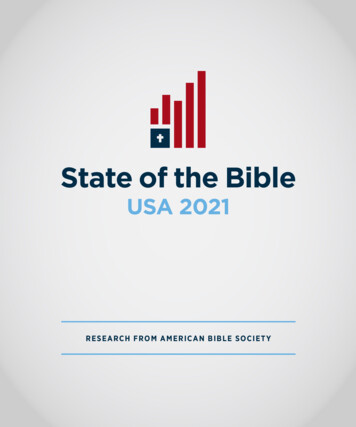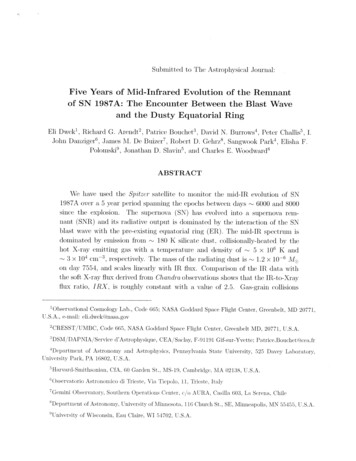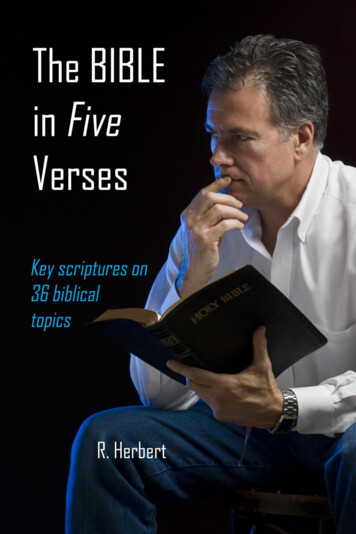
Transcription
The BIBLEIn Five VersesKey scriptures on36 biblical topicsBy R. Herbert
2015, Living Belief Books – an Imprint ofLivingWithFaith.org & TacticalChristianity.orgThe text and images in this e-book are copyright.All Rights Reserved.ISBN 978-1-943280-38-4This book is not to be sold. It is made available without charge bythe publisher and free copies can be downloaded from:LivingWithFaith.org or TacticalChristianity.org .Most Scripture quotations in this book are from the ESV Bible(The Holy Bible, English Standard Version ), copyright 2001 byCrossway, a publishing ministry of Good News Publishers. Used bypermission. All rights reserved.In a few cases, the NIV (New International Version ), HCSB(Holman Christian Standard Bible ) and NKJV (New King JamesVersion ) are cited, and these translations are also gratefullyacknowledged.Cover: Base image by Jake Hellbach
CONTENTSIntroductionPART ONE: WHAT WE NEED TO KNOW1. The Bible2. God the Father3. Jesus Christ4. The Holy Spirit5. Humanity6. Sin7. Salvation8. The Gospel9. The Church10. Rebirth11. The Kingdom of God12. Eternal Life
PART TWO: WHAT WE NEED TO DO13. Repentance14. Baptism15. Fellowship16. Encouragement17. Good Works18. Sharing Our Faith19. Forgiving Others20. Resisting Temptation21. Giving Thanks22. Bible Study23. Prayer24. WorshipPART THREE: WHAT WE NEED TO HAVE25. Indwelling of the Spirit26. Fruits of the Spirit27. Faith
28. Hope29. Love30. Truth31. Obedience32. Purity33. Courage34. Humility35. Wisdom36. EnduranceAfterword
INTRODUCTIONThis easy-to-read and understand eBook is not a guide to the storiesor characters of the Bible – it explains thirty-six “key” Christianbeliefs and principles of living. Each topic has a short introductionand five carefully selected biblical verses or passages, followed by aquestion for further reflection and additional scripture references.In this way, the selected concepts are first explained with scripturesto which the reader can refer, and then the Bible is allowed to speakfor itself regarding what it has to say on each subject.This is not a theological treatise, however, and its size precludes anyattempt to be complete in covering all aspects of the Bible. TheBible in Five Verses primarily aims to provide a basic introductionto biblical concepts helpful for those new to the Christian faith. Thebook has been prepared with this goal in mind and is intendedespecially for our newer brothers and sisters in parts of Africa, Asia,and other areas of the world where printed materials are oftendifficult to obtain. Readers in many of these areas are using Englishas a second or even third language and so technical theologicalterms have generally been avoided in favor of more widelyunderstood words.The Bible in Five Verses is designed to provide a simple logicalsurvey of what the Bible teaches that may be used in missionarywork and teaching, as well as for independent individual study. Butthis book may also be profitable for established believers as a reviewresource and even as an inspirational tool. Its thirty-six shortchapters, each with key scriptures and a question to ponder, lendthemselves to reading one chapter a day in just over one month.
Of course, everyone has his or her own view of what is a “key” orimportant biblical concept or verse. As a result, many readers mayask “Where is Grace?” “Where is Redemption” or whatever topiceach individual feels should have been separately included. Theauthor can only stress that many such concepts are included withinthe various chapters, or they are explained under different,sometimes simpler, non-theological headings. Some topics, such as*Love, also include a number of related concepts such as kindness,brotherly affection, etc. (1 Corinthians 13:4-7), which are nottreated separately.However, because of the compact size of the book, many areas ofbelief and practice simply could not be added. Yet we have tried toinclude what a majority of Christians would regard as perhaps themost important areas of our faith. Because this book was purposelydesigned to have a relatively small digital footprint to allow easydownloading and transfer, even on the slow internet connectionsfound in many areas of the world, passages are sometimes abridged(indicated by ), but are not otherwise modified.The subjects included in this book are organized into twelve thingswe need to “know,” twelve actions we need to “do,” and twelvequalities that we need to “have.” By grouping concepts in this way,we were able to present aspects of Christian belief so that theirrelevance can be easily grasped.So, whether you are new to the Christian faith or an establishedbeliever who would like to review some key scriptures on yourbeliefs, we hope you will find this small book helpful insummarizing the main points of the message of the Bible “in fiveverses.” May you be blessed with understanding as you read it.*An asterisk before a word in the text indicates that there is a separateentry on that subject elsewhere in the book.
PART ONE:WHAT WE NEED TO KNOW
1. THE BIBLEThe idea that God would send a number of letters to us, that wecould read and be instructed by, is an amazing one – but that, ofcourse, is what the Bible is. The combined sixty-six books of theHebrew and Greek Scriptures – called by Christians the Old andNew Testament – claim to be the inspired word of God (2 Timothy3:16), and Christians believe that God directly guided the writingand editing of these biblical books through *The Holy Spirit (2Peter 1:21).Believers know that there are many indications of the inspirednature of these sacred writings, ranging from fulfilled prophecies tocommands which, when kept, result in clear blessings. Thus,Christians follow the Bible as the ultimate authority in their lives(Matthew 4:4) and regard it as the only inspired book in which thegood news of God’s purpose for humanity is explained along witheverything we need to know to fulfill that purpose (John 5:39, 2Timothy 3:17).The individual books that make up the Bible (39 in the OldTestament, 27 in the New Testament) were written over a period ofsome 1,500 years by many different authors and are of manydifferent types: books of law, history, prophecy, poetry, wisdom,and letters. But all the books in this sacred library share incommon the inspired ability to guide, correct, instruct, andencourage those who read them (2 Timothy 3:16-17) so the analogyof “letters from God” still holds, whichever type of literature a givenbiblical book may be.Dedicated Christians find that they can never outgrow the Bible –no matter how many times we may read it, we continue to find newunderstandings, insights and guidance within its pages.
The Bible in Five Verses: Psalm 119:105 ESVYour word is a lamp to my feet and a light to my path. Matthew 4:4 ESV It is written, “Man shall not live by bread alone, but by everyword that comes from the mouth of God.” 2 Timothy 3:16-17 ESVAll Scripture is breathed out by God and profitable for teaching,for reproof, for correction, and for training in righteousness, thatthe man of God may be complete, equipped for every good work. Hebrews 4:12 ESVFor the word of God is living and active, sharper than any twoedged sword, piercing to the division of soul and of spirit, ofjoints and of marrow, and discerning the thoughts and intentionsof the heart. Romans 15:4 NIVFor everything that was written in the past was written to teachus, so that through the endurance taught in the Scriptures andthe encouragement they provide we might have hope.Something to think about: Do I have a clear understanding ofthe indications we have that the Bible is truly inspired – what wouldI say if a friend asked me how I knew the Bible was really the wordof God?Some other scriptures on this topic:10:17, 1 Thessalonians 2:13, 2 Peter 1:21.Related topics in this book:John 17:17, Romans*Bible Study, *The Gospel.
2. GOD THE FATHERGod who is eternal, invisible, and immortal (1 Timothy 1:17), as wellas all powerful, all knowing, and everywhere present (Psalm 147:5,Jeremiah 23:24), not only personifies the epitome of goodness,greatness, wisdom, love, justice, truth, compassion, beauty, and analmost infinite number of other qualities, but also his perfection inevery one of those areas is far greater than we can imagine withhuman comprehension. Yet, through his Son, *Jesus Christ, Godhas revealed himself to us in an understandable way as a lovingheavenly Father.God is spoken of as a Father in several places in the Old Testament(Isaiah 63:16, 64:8, Malachi 2:10, etc.), just as some Old Testamentverses also speak of a divine Son. But it is in the New Testamentthat we find clear revelation of the Father, for the first time, in theteaching and work of Jesus Christ (Luke 10:22, John 14:9-11).The New Testament writers tell us that the Father is the source ofall things (1 Corinthians 8:6, Ephesians 4:6) and that Jesus Christcame from him (1 John 4:14) and returned to him (John 16:28), andthat at the conclusion of his plan for humankind the Father willfully reveal himself and will rule over his children forever(Revelation 21:3). A number of the biblical writers also stress (oftenusing the expression “Blessed be the God and Father of our LordJesus Christ!”) that the Father is the source of all good gifts andhelp to those who seek him (Matthew 7:11, 2 Corinthians 1:3-4,Ephesians 1:3, James 1:17, 1 Peter 1:3).Jesus encouraged us to pray directly to the Father (Matthew 6:9).He also gave us the example of calling on the Father in prayer usingthe Aramaic word Abba (Mark 14:36), which conveyed a familialattitude of intimate respect similar to the English words “DearFather.”
God the Father in Five Verses: 1 Corinthians 8:6 ESV there is one God, the Father, from whom are all things andfor whom we exist. 1 John 4:14 ESVAnd we have seen and testify that the Father has sent his Sonto be the Savior of the world. Luke 10:22 ESVAll things have been handed over to me by my Father, and noone knows who the Son is except the Father, or who theFather is except the Son and anyone to whom the Son choosesto reveal him. John 14:9-10 ESV Whoever has seen me has seen the Father. How can you say,‘Show us the Father’? Do you not believe that I am in theFather and the Father is in me? The words that I say to you Ido not speak on my own authority, but the Father who dwellsin me does his works. Revelation 21:3 ESVAnd I heard a loud voice from the throne saying, “Behold, thedwelling place of God is with man. He will dwell with them,and they will be his people, and God himself will be with themas their God .”Something to think about: What ways can I think of in whichthe concept of “Father” applies to God?Some other scriptures on this topic: Isaiah 64:8, Matthew23:9, James 1:17.Related topics in this book: *Jesus Christ, *The Holy Spirit.
3. JESUS CHRISTChristianity teaches that the One who became Jesus the Christ (thepromised Messiah) existed eternally with God and as God (John1:1-3). It was apparently Jesus, in his pre-incarnate state as theWord of God, who interacted directly with humanity in OldTestament times (John 1:18, 5:37, 6:46, 1 Corinthians 10:4). TheOld Testament Scriptures often speak of the coming of a godlyfigure, but they speak of both a suffering servant (Isaiah 53, etc.)and a conquering king (Daniel 7:13, etc). Christians believe thatJesus fulfilled the first role at his first coming and will fulfill thesecond role at his return.The New Testament tells us that at his first coming Jesus wasconceived by the *Holy Spirit and thus combined humanity with hisgodly nature. It tells us that Jesus lived a sinless life and was thusable to give himself as a sacrifice, dying by crucifixion in order topay for all of humanity’s sins. Jesus was then resurrected andascended to Heaven from where he will return. At his secondcoming, the New Testament shows Christ will return with greatpower to rule the nations, to judge mankind, and to prepare theearth for the eventual dwelling of God with a redeemed humanity.In reading scriptures speaking of Jesus we must look carefully tosee if they speak of his first coming (as servant) or second coming(as king), or both, as is sometimes the case (for example, Luke 1:3133).Christians enter into a close relationship with Jesus Christ as he isour Lord (Romans 10:9), Savior (Luke 2:11, Acts 4:12), High Priest(Hebrews 4:14-16), and elder Brother in the family of God (Romans8:14-17, 29, Hebrews 2:11). In the rite of *Baptism we are unitedwith Christ in his death and resurrection, and every Christian alsobecomes part of the “body” of Christ – the *Church (1 Corinthians12:27, Ephesians 4:12, 15-16).
Jesus Christ in Five Verses: John 1:1-3, 14 ESVIn the beginning was the Word, and the Word was with God,and the Word was God. He was in the beginning with God.All things were made through him, and without him was notany thing made that was made And the Word became fleshand dwelt among us, and we have seen his glory, glory as ofthe only Son from the Father, full of grace and truth. Luke 1:31-33 ESVAnd behold, you will conceive in your womb and bear a son,and you shall call his name Jesus. He will be great and will becalled the Son of the Most High. And the Lord God will give tohim the throne of his father David, and he will reign over thehouse of Jacob forever, and of his kingdom there will be noend. Hebrews 1:3 ESVHe is the radiance of the glory of God and the exact imprint ofhis nature, and he upholds the universe by the word of hispower. After making purification for sins, he sat down at theright hand of the Majesty on high Hebrews 9:28 ESVso Christ, having been offered once to bear the sins of many,will appear a second time, not to deal with sin but to savethose who are eagerly waiting for him. Revelation 11:15 NKJVThen the seventh angel sounded: And there were loud voicesin heaven, saying, “The kingdoms of this world have becomethe kingdoms of our Lord and of His Christ, and He shall reignforever and ever! ”
Something to think about: Many Christians know the conceptof Jesus as the suffering Servant better than they know the conceptof Christ as King. Do I know the scriptures that show both aspectsof God the Son?Some other scriptures on this topic:24:30, John 11:25, 1 John 4:14.Isaiah 9:6, MatthewRelated topics in this book: *God the Father, *The Holy Spirit,*Salvation, *The Gospel, *The Church.
4. THE HOLY SPIRITGod is Spirit (John 4:24), but the Bible also speaks of the Spirit ofGod (Romans 8:11, etc.). It also speaks of the Spirit of Jesus(Galatians 4:6), but we understand there is only one Holy Spirit(Ephesians 4:4) – part of the nature of the One God (Acts 5:3-4,16:6-7). It is through the Holy Spirit that God is presenteverywhere (Psalm 139:7), that he creates (Genesis 1:2, Job 33:4),and empowers those with whom he chooses to work (Hebrews 2:4).Throughout the Old Testament we find many scriptures explaininghow God accomplished his purposes, including working throughand influencing people by means of his Spirit (1 Samuel 11:6). It isthrough the Holy Spirit that God revealed things to his servants(Ezekiel 11:24) and delivered messages by them (1 Samuel 10:10, 2Peter 1:21). When individuals were especially empowered by God,they are said to have been “clothed” by his Spirit (Judges 6:34, etc.),but the Spirit of God is usually said to have been “among” mostindividuals (Isaiah 63:11, etc.) in Old Testament times, and only insome few cases do we find clear indication that the Spirit operatedwithin individuals. This closer relationship with the Spirit of Godwas prophesied for God’s people, however, and we see thefulfilment of this after the resurrection of Jesus, who promised theHoly Spirit would be given to his followers (John 14:26, Acts 1:5, 8).In our relationship with God, we experience *Rebirth by means ofthe Holy Spirit (1 Peter 1:3, 23) when we turn to him in*Repentance (see also *Indwelling of the Spirit). Godcommunicates with us and enables us to communicate with himthrough the Holy Spirit (1 Corinthians 2:14, Romans 8:27,Philippians 3:3), and he provides us with many spiritual gifts whichthe apostle Paul calls the “fruits” of the Spirit (*Fruits of the Spirit).It is the indwelling Holy Spirit that gives us fellowship with Godand with one another (2 Corinthians 13:14).
The Holy Spirit in Five Verses: Genesis 1:2 ESVThe earth was without form and void, and darkness was overthe face of the deep. And the Spirit of God was hovering overthe face of the waters. 2 Peter 1:21 ESVFor no prophecy was ever produced by the will of man, butmen spoke from God as they were carried along by the HolySpirit. Hebrews 2:3-4 NIVThis salvation, which was first announced by the Lord, wasconfirmed to us by those who heard him. God also testified toit by signs, wonders and various miracles, and by gifts of theHoly Spirit distributed according to his will. John 14:26 ESVBut the Helper, the Holy Spirit, whom the Father will send inmy name, he will teach you all things and bring to yourremembrance all that I have said to you. Romans 8:9, 11, 27 NIVYou, however, are not in the realm of the flesh but are in therealm of the Spirit, if indeed the Spirit of God lives in you. Andif anyone does not have the Spirit of Christ, they do not belongto Christ And if the Spirit of him who raised Jesus from thedead is living in you, he who raised Christ from the dead willalso give life to your mortal bodies because of his Spirit wholives in you And he who searches our hearts knows the mindof the Spirit, because the Spirit intercedes for God’s people inaccordance with the will of God.
Something to think about: The Bible promises God’s servants agreat many gifts through the indwelling of the Holy Spirit. Do Iregularly claim those gifts as they are needed in my life?Some other scriptures on this topic: Zechariah 4:6, Matthew12:32, Ephesians 4:30.Related topics in this book: *God the Father, *Jesus Christ,*Indwelling of the Spirit, *Fruits of the Spirit.
5. HUMANITYThe Bible teaches a number of important concepts regardinghumanity. First and foremost it reveals that mankind was created“in the image of God” (Genesis 1:26). Many scriptures show thatalthough made from the “dust of the earth,” humankind is one ofthe high points of all God’s creation and has the great potential tobecome one with God (1 Corinthians 15:44-49) as part of his family(John 1:12-13, 1 John 3:1-2).According to Genesis, humanity originally had the opportunity tolive forever, as symbolized by the tree of life in the Garden of Edenstory. Because of *Sin, humans lost this opportunity and humanitycontinues to live under the penalty and horrible results of sin. Butthrough the life and death of *Jesus Christ who was also the “Son ofMan” (Matthew 18:11, etc.), we are given the opportunity to fulfillthat original potential.In creating mankind as male and female God not only provided forhuman reproduction, but also intended the sexes to beinterdependent and complementary to the development of eachother (1 Corinthians 11:11) as full heirs together of God’s purpose forhumanity (1 Peter 3:1, 7). While this is an aspect of Christianitymany take for granted, it is a distinctive part of the faith andcontrasts with the teachings of many other religions of the world.Humanity in Five Verses: Genesis 1:26-27 ESVThen God said, “Let us make man in our image, after ourlikeness. And let them have dominion over the fish of the seaand over the birds of the heavens and over the livestock andover all the earth and over every creeping thing that creeps onthe earth.” So God created man in his own image, in the imageof God he created him; male and female he created them.
Genesis 5:2 NIVHe created them male and female and blessed them. And henamed them "Mankind" when they were created. 1 Corinthians 11:11 ESV in the Lord woman is not independent of man nor man ofwoman. Psalm 8:4-5 NIVwhat is mankind that you are mindful of them, human beingsthat you care for them? You have made them a little lowerthan the angels and crowned them with glory and honor. Acts 17:24-26 NIVThe God who made the world and everything in it . giveseveryone life and breath and everything else. From one manhe made all the nations, that they should inhabit the wholeearth; and he marked out their appointed times in history andthe boundaries of their lands.Something to think about: Think about why God createdmankind – what were his reasons for making humanity?Some other scriptures on this topic:Corinthians 15:44-49.Genesis 2:7, 1Related topics in this book: *Sin, *Salvation, *Eternal Life.
6. SINThe story of the creation of mankind tells us that although the firsthumans were created sinless (Genesis 1:26, 31), they had thecapacity to choose evil and in choosing the forbidden “tree of theknowledge of good and evil” they sinned. This sin affected all ofsubsequent humanity, but the Bible is also clear that individually“all have sinned” (Romans 3:10, 23) and brought upon themselvesthe penalty of sin, which is being cut off from God (Isaiah 59:2) andeventual death (Romans 5:12-23, 6:23).God’s word teaches that the penalty of our sin can only be removedby a perfect sinless individual – his Son – paying the penalty on ourbehalf, and it is through this sacrifice alone that we can receiveforgiveness and *Salvation.In grasping the universal sinfulness of humanity, we mustunderstand that sin can be the result of not only doing somethingwe should not do (1 John 3:4) or not doing something we should do(James 4:17), but also of what we are by nature – as is seen in thewords of Christ himself (Mark 7:20-23). Christ also showed that wecan sin in attitude and thought just as much as in word or deed(Matthew 5:28), and that we are slaves to our sinful nature unlesswe are freed from it (John 8:34) through God’s forgiveness andthrough spiritual *Rebirth. This process of salvation isaccomplished through faith with *Repentance and *Baptismleading to the imparting of a new nature within us through the*Holy Spirit (Titus 3:5).Even with a renewed nature, our old self and its proclivity to sinremains; but the Christian chooses a life of increasingtransformation away from sin, which will lead to an eventualeternal existence where sin is not present at all (1 John 3:9,Revelation 22:14-15 ).Sin in Five Verses: Romans 3:23 HCSBFor all have sinned and fall short of the glory of God.
Mark 7:20-23 ESV “What comes out of a person is what defiles him. For fromwithin, out of the heart of man, come evil thoughts, sexualimmorality, theft, murder, adultery, coveting, wickedness,deceit, sensuality, envy, slander, pride, foolishness. All theseevil things come from within, and they defile a person.” Isaiah 64:6 NIVAll of us have become like one who is unclean, and all ourrighteous acts are like filthy rags; we all shrivel up like a leaf,and like the wind our sins sweep us away. 1 John 1:8-10 ESVIf we say we have no sin, we deceive ourselves, and the truth isnot in us. If we confess our sins, he is faithful and just toforgive us our sins and to cleanse us from all unrighteousness.If we say we have not sinned, we make him a liar, and hisword is not in us. 1 John 3:6-9 ESVNo one who abides in him keeps on sinning; no one who keepson sinning has either seen him or known him. Little children,let no one deceive you. Whoever practices righteousness isrighteous, as he is righteous. Whoever makes a practice ofsinning is of the devil, for the devil has been sinning from thebeginning No one born of God makes a practice of sinning,for God's seed abides in him, and he cannot keep on sinningbecause he has been born of God.Something to think about:Do I understand that trueconversion does not keep us sinless (1 John 1:8), but that it involvesongoing confession and growth away from sin so that we no longer“make a practice” (1 John 3:9) of ongoing sin?Some other scriptures on this topic: Romans 5:12-23, 6:23,James 4:17, 1 John 3:4.Related topics in this book:*Salvation, *Forgiveness.*Jesus Christ, *The Gospel,
7. SALVATIONThrough *Sin all humans have come under the penalty of eternaldeath (Romans 6:23), but through God’s offer of salvation we havethe opportunity to be rescued from that fate. At times, the Bibleuses the word “salvation” to refer to being rescued from physicaldanger or problems (Philippians 1:19, etc.), but usually the wordrefers to spiritual, eternal salvation from the penalty of sin (Romans5:9, 1 Thessalonians 5:9).In the teaching of Jesus (whose name means “salvation” or “Godsaves”), being saved also is equated with entry into the *Kingdom ofGod (Matthew 19:24-25), as we must, of course, be saved in order tofulfill our purpose by becoming part of God’s kingdom and family(Romans 8:14-17).The Bible is clear that there is nothing we can do as humans to“earn” salvation. God forgives sin not as a result of our works(Ephesians 2:8, 2 Timothy 1:9a, Titus 3:5a), but as an act ofundeserved love and mercy (often called “Grace”) by substitutingthe death of Jesus Christ on our behalf (Romans 5:10; Ephesians1:7). That “paying of the penalty” for our sin is only applied to us ifwe accept the salvation God offers us (Ephesians 2:5, 8).Our receiving salvation occurs as a process, not an instantaneousevent, however. We receive God’s gift of forgiveness and salvationthrough first hearing and coming to understand the *Gospel(Ephesians 1:13). We then must undergo sincere *Repentance ofour sins (Acts 3:19), *Baptism (Acts 2:38), accepting in faith JesusChrist’s sacrifice on our behalf (Acts 4:12) and his resurrectionagain to life (Romans 10:9-10), and accepting him as Lord and rulerin our lives (Romans 10:9, 13).Once we have done these things God requires of us, we haveassurance that God forgives our sins and will grant us his free gift ofsalvation (Romans 5:10, 21) if we continue with him (1 Corinthians15:1-2, Hebrews 3:14, 10:26).
Salvation in Five Verses: John 3:16-17 ESVFor God so loved the world, that he gave his only Son, thatwhoever believes in him should not perish but have eternallife. For God did not send his Son into the world to condemnthe world, but in order that the world might be saved throughhim. 2 Timothy 1:9 NIVHe has saved us and called us to a holy life—not because ofanything we have done but because of his own purpose andgrace. This grace was given us in Christ Jesus before thebeginning of time Ephesians 2:8-9 ESVFor by grace you have been saved through faith. And this isnot your own doing; it is the gift of God, not a result of works,so that no one may boast. Acts 4:10-12 ESV by the name of Jesus Christ of Nazareth there is salvationin no one else, for there is no other name under heaven givenamong men by which we must be saved. Romans 10:9 HCSBIf you confess with your mouth, “Jesus is Lord,” and believe inyour heart that God raised him from the dead, you will besaved.Something to think about:Have I completed all the stepsGod’s word shows are required for salvation?Some other scriptures on this topic:16:30-33, Romans 10:13, Titus 3:5.Mark 16:15-16, ActsRelated topics in this book: *Sin, *The Gospel, *Repentance,*Baptism.
8. THE GOSPELThe term “gospel” is used over 75 times in the New Testament andits fundamental meaning is “good news.” In the teaching of Jesus,the gospel often referred to the good news of the institution of theKingdom of God – the ultimate goal of *Salvation (Matthew 4:23).But the gospel also included the message that we must repent if weare to be part of that kingdom (Mark 1:15). After the resurrection ofJesus the gospel always included teaching about the person,identity and role of Jesus Christ in God’s plan (Acts 9:20, Romans1:2-3, 1 Corinthians 15:1-4).When we consider all the scriptures on this topic, we see that thegospel may be explained in five points:1) We were created in the potential image of God to become likehim (Ephesians 4:24, Colossians 3:10), but we have all sinned andfallen short of God’s perfect and glorious nature (Romans 3:23).2) As a result of sin we have all incurred the penalty of death(Romans 6:23).3) So God sent his Son Jesus Christ into the world to pay thepenalty of sin on our behalf (Romans 5:8).4) If we repent and accept, by faith, Christ’s sacrifice on ourbehalf, we can be forgiven and renewed through the gift of theHoly Spirit (Acts 2:38, Romans 3:24-25).5) Just as we become one with Christ in his death, so we becomeunited with him in his resurrection to eternal life (Romans 6:5, 23;Ephesians 1:13).The Gospel in Five Verses: 1 Corinthians 15:1-4 ESVNow I would remind you, brothers, of the gospel I preached toyou, which you received, in which you stand, and by which youare being saved, that Christ died for our sins in accordancewith the Scriptures, that he was buried, that he was raised onthe third day in accordance with the Scriptures,
Romans 1:16 ESVFor I am not ashamed of the gospel, for it is the power of Godfor salvation to everyone who believes, to the Jew first andalso to the Greek. Colossians 1:21-23 NIVOnce you were alienated from God and were enemies in yourminds because of your evil behavior. But now he hasreconciled you by Christ’s physical body through death topresent you holy in his sight, without blemish and free fromaccusation — if you continue in your faith, established andfirm, and do not move from the hope held out in the gospel. Ephesians 1:13 HCSBWhen you heard the message of truth, the gospel of yoursalvation, and when you believed in Him, you were also sealedwith the promised Holy Spirit. Matthew 24:14 NIVAnd this gospel of the kingdom will be preached in the wholeworld as a testimony to all nations, and then the end willcome.Something to think about: Paul warns us not to accept anygospel other than that which he and the other apostles taught(Galatians 1:8-9). Have I accepted any other aspects into myunderstanding of the gospel that are
The Bible 2. God the Father 3. Jesus Christ 4. The Holy Spirit 5. Humanity 6. Sin 7. Salvation 8. The Gospel 9. . This easy-to-read and understand eBook is not a guide to the stories . Romans 15:4 NIV For eve

